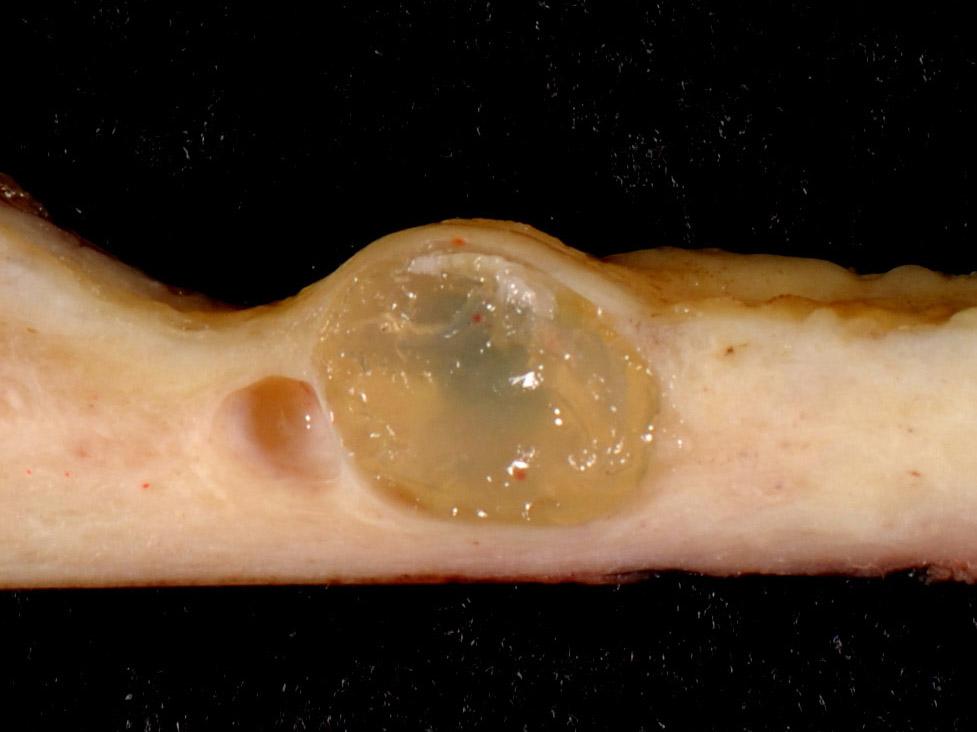Last Updated on January 6, 2025
Yes, it is possible to get pregnant with a nabothian cyst. Now, let’s explore the relationship between nabothian cysts and fertility in more detail.
Nabothian cysts are harmless fluid-filled growths that form on the cervix. These cysts are quite common and usually do not cause any fertility issues. They typically do not interfere with the process of conception or pregnancy. However, in rare cases, large or multiple cysts may obstruct the cervical opening, making it difficult for sperm to reach the egg.
If you are concerned about fertility and have a nabothian cyst, it is best to consult with your healthcare provider for personalized advice and guidance.

Credit: www.medicalnewstoday.com
Related: Can You Get Veneers While Pregnant?
Understanding Nabothian Cysts
Nabothian cysts are a common gynecological condition that can cause concerns for women who are trying to conceive. These cysts develop on the surface of the cervix and are usually harmless. In this section, we will delve into what nabothian cysts are, their causes and risk factors, as well as the symptoms and diagnosis involved.
What Are Nabothian Cysts?
Nabothian cysts, also known as epithelial inclusion cysts, are small fluid-filled sacs that form on the surface of the cervix. They are typically benign and do not pose any serious health risks. These cysts are often small in size and can range in color from clear to yellowish.
While they are generally harmless, larger cysts may cause discomfort or lead to certain symptoms.
Causes And Risk Factors Of Nabothian Cysts
The exact cause of nabothian cysts is not fully understood. However, these cysts commonly occur when the normal glandular cells of the cervix become trapped within the outer cells of the cervix, resulting in the development of a cyst. Some potential causes and risk factors of nabothian cysts include:
- Childbirth: Women who have given birth multiple times may be at a higher risk of developing nabothian cysts.
- Infections: Certain infections, such as sexually transmitted infections or chronic cervicitis, may contribute to the development of these cysts.
- Hormonal changes: Fluctuations in hormone levels, particularly estrogen, can influence the occurrence of nabothian cysts.
Symptoms And Diagnosis Of Nabothian Cysts
Nabothian cysts are often asymptomatic, meaning they do not cause any noticeable symptoms. However, in some cases, women may experience the following symptoms:
- Vaginal discharge: A thick, mucus-like discharge may be present due to the cysts.
- Pelvic pain: Larger cysts or multiple cysts may cause discomfort or pain in the pelvic region.
- Pain during sexual intercourse: Women with nabothian cysts may experience discomfort or pain during intercourse.
To diagnose nabothian cysts, a healthcare provider typically performs a pelvic examination. During this examination, the cysts can be visually observed on the cervix. In some cases, additional diagnostic tests, such as ultrasound or colposcopy, may be recommended to confirm the diagnosis or rule out other potential conditions.
While nabothian cysts may cause concern for women trying to conceive, they generally do not interfere with fertility. It is important to consult with a healthcare provider if you have any concerns or experience bothersome symptoms related to nabothian cysts.
Remember, understanding nabothian cysts and their potential impact on fertility can help ease your worries and ensure you are well-informed about your reproductive health.
Impact Of Nabothian Cysts On Fertility
The Impact Of Nabothian Cysts On Fertility
Nabothian cysts are small fluid-filled sacs that form on the surface of the cervix. While they are usually harmless and do not require treatment, many women wonder if these cysts can affect their fertility. In this section, we will explore the potential impact of nabothian cysts on fertility, potential complications during pregnancy, and how to manage these cysts while trying to conceive.
Can Nabothian Cysts Affect Fertility?
While nabothian cysts are commonly found in women of reproductive age, they do not generally have a significant impact on fertility. Here are a few key points to keep in mind:
- Nabothian cysts are usually benign and not associated with any serious health concerns.
- These cysts typically do not interfere with the sperm or egg’s ability to meet and fertilize, as they are located on the outer surface of the cervix.
- In rare cases where nabothian cysts grow larger or cluster together, they may obstruct the cervical opening and impede the movement of sperm. However, this occurrence is extremely uncommon.
Potential Complications During Pregnancy
If you have nabothian cysts and become pregnant, it is essential to understand any potential complications that may arise. Here are a few key points:
- In general, nabothian cysts do not pose a significant risk during pregnancy and typically do not require any specific treatment.
- However, if the cysts grow larger during pregnancy, they may cause discomfort or pain. Your healthcare provider will monitor the cysts’ size and address any symptoms that may arise.
- It is important to note that nabothian cysts are not associated with an increased risk of miscarriage or other pregnancy complications.
Related: Can You Go Horseback Riding While Pregnant?
How To Manage Nabothian Cysts While Trying To Conceive
If you are actively trying to conceive and have nabothian cysts, here are some strategies to manage your condition:
- Regular check-ups with your healthcare provider are crucial to monitor the size and progression of the cysts.
- In most cases, no treatment is necessary unless the cysts cause symptoms or significantly grow in size.
- Maintaining a healthy lifestyle, including a balanced diet, regular exercise, and stress management, can contribute positively to your overall fertility.
- Good communication with your partner and open discussions about any concerns or challenges you may face during your fertility journey can help you navigate the process together.
Remember, nabothian cysts are generally harmless and do not typically impact fertility. However, if you have any concerns or questions about your specific situation, it is always best to consult with your healthcare provider who can provide personalized advice and guidance.
Stay positive and trust your body’s natural processes as you embark on your journey to conceive.
Treatment Options And Recommendations
Nabothian cysts are common benign growths that can develop on the surface of the cervix. If you’re wondering whether you can get pregnant with a nabothian cyst, the good news is that these cysts typically do not interfere with fertility.
However, if you’re actively trying to conceive and have been diagnosed with nabothian cysts, you may have some concerns about the impact they could have on your journey to motherhood. In this section, we will explore the treatment options and recommendations for women with nabothian cysts who are trying to conceive.
Medical And Surgical Treatment Options For Nabothian Cysts:
- In most cases, nabothian cysts do not require any treatment, as they often resolve on their own without causing any symptoms or complications.
- If your nabothian cysts are causing discomfort or if they are significantly large, your healthcare provider may suggest medical or surgical interventions.
- Small cysts that are causing minimal symptoms can be managed with conservative approaches such as warm sitz baths or the application of topical or oral pain relievers.
- For larger or persistent cysts, your healthcare provider may recommend a simple procedure called cyst drainage. This involves puncturing the cyst and draining its contents to alleviate symptoms.
- In rare cases where nabothian cysts are causing significant symptoms or affecting fertility, surgical removal of the cysts may be necessary. This can usually be done through a minimally invasive procedure such as colposcopy or cryotherapy.
Lifestyle Changes To Improve Fertility Chances:
- Focus on maintaining a healthy and balanced diet. Include fresh fruits, vegetables, whole grains, lean protein sources, and healthy fats in your meals.
- Get regular exercise to support overall well-being and maintain a healthy weight.
- Prioritize stress management techniques such as meditation, yoga, or deep breathing exercises.
- Avoid smoking, excessive alcohol consumption, and recreational drug use, as these can negatively impact fertility.
- Ensure you’re getting enough quality sleep. Aim for seven to eight hours of sleep per night.
Related: Can You Go To The Gun Range While Pregnant?
Expert Tips For Women With Nabothian Cysts Trying To Conceive:
- Communicate openly with your healthcare provider about your concerns and goals. They can provide personalized guidance based on your specific situation.
- Consider tracking your menstrual cycles and utilizing ovulation prediction methods, such as tracking basal body temperature or using ovulation predictor kits, to optimize timing for conception.
- Maintain regular gynecological check-ups to monitor the size and progression of your nabothian cysts.
- Stay positive and focus on maintaining a healthy lifestyle. Remember that many women with nabothian cysts are able to conceive and have healthy pregnancies.
Remember, if you have any concerns about your fertility or the impact of nabothian cysts on your ability to conceive, it is always best to consult with your healthcare provider. They can provide personalized recommendations tailored to your unique needs.
Frequently Asked Questions For Can I Get Pregnant With Nabothian Cyst?
Can Nabothian Cysts Affect Fertility?
Nabothian cysts are harmless and typically do not affect fertility or the ability to get pregnant.
Can Nabothian Cysts Cause Miscarriage?
There is no evidence linking nabothian cysts to miscarriages. These cysts are generally benign and pose no threat to pregnancy.
Can Nabothian Cysts Disappear On Their Own?
Yes, nabothian cysts often resolve on their own without treatment and usually do not cause any symptoms.
Can Nabothian Cysts Increase The Risk Of Complications?
Nabothian cysts are rarely associated with complications and usually do not require medical intervention.
Conclusion
The presence of a nabothian cyst does not necessarily affect a woman’s ability to conceive. While the cysts may cause concerns and discomfort, they are typically harmless and rarely interfere with fertility. It is important for women who are trying to conceive to consult with a healthcare provider to ensure proper diagnosis and management of the cysts.
If deemed necessary, the cysts can be treated or removed to alleviate any potential obstacles to pregnancy. However, in most cases, nabothian cysts are harmless and will not impede fertility. Remember, every woman’s reproductive health is unique, and it is always best to seek professional guidance when in doubt.
By staying informed and addressing any concerns, women can navigate their fertility journey with confidence and peace of mind.











